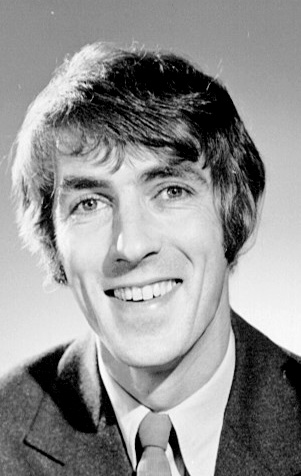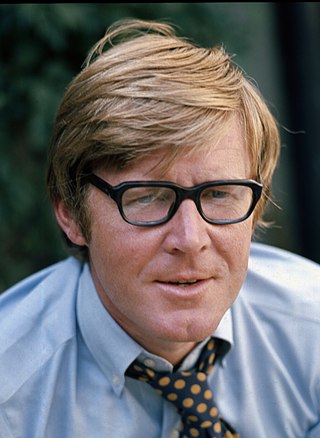
Peter Edward Cook was an English comedian, actor, satirist, playwright and screenwriter. He was the leading figure of the British satire boom of the 1960s, and he was associated with the anti-establishment comedic movement that emerged in the United Kingdom in the late 1950s.

Dudley Stuart John Moore CBE was an English actor, comedian, musician and composer. Moore first came to prominence in the UK as a leading figure in the British satire boom of the 1960s. He was one of the four writer-performers in the comedy revue Beyond the Fringe from 1960 that created a boom in satiric comedy. With a member of that team, Peter Cook, Moore collaborated on the BBC television series Not Only... But Also. As a popular double act, Moore's buffoonery contrasted with Cook's deadpan monologues. They jointly received the 1966 British Academy Television Award for Best Entertainment Performance and worked together on other projects until the mid-1970s, by which time Moore had settled in Los Angeles to concentrate on his film acting.

Alan Bennett is an English playwright, author, actor and screenwriter. Over his entertainment career he has received numerous awards and honours including two BAFTA Awards, four Laurence Olivier Awards, and two Tony Awards. He also earned an Academy Award nomination for his film The Madness of King George (1994). In 2005 he received the Society of London Theatre Special Award.

Art of Noise were a British avant-garde synth-pop group formed in early 1983 by engineer/producer Gary Langan and programmer J. J. Jeczalik, along with keyboardist/arranger Anne Dudley, producer Trevor Horn, and music journalist Paul Morley. The group had international Top 20 hits with its interpretations of "Kiss", featuring Tom Jones, and the instrumental "Peter Gunn", which won a 1986 Grammy Award.

Anne Jennifer Dudley is a British composer, keyboardist, conductor and pop musician. She was the first BBC Concert Orchestra's Composer in Association in 2001. She has worked in the classical and pop genres, as a film composer, and was one of the core members of the synth-pop band Art of Noise. In 1998, Dudley won an Oscar for Best Original Musical or Comedy Score for The Full Monty. In addition to over twenty other film scores, in 2012 she served as music producer for the film version of Les Misérables, also acting as arranger and composing some new additional music.
PolyGram N.V. was a multinational entertainment company and major music record label formerly based in the Netherlands. It was founded in 1962 as the Grammophon-Philips Group by Dutch corporation Philips and German corporation Siemens, to be a holding for their record companies, and was renamed "PolyGram" in 1972. The name was chosen to reflect the Siemens interest Polydor Records and the Philips interest Phonogram Records. The company traced its origins through Deutsche Grammophon back to the inventor of the flat disc gramophone, Emil Berliner.

PolyGram Filmed Entertainment was a film production company founded in 1975 as an American film studio, which became a European competitor to Hollywood within two decades, but was eventually sold to Seagram Company Ltd. in 1998 and was folded a year later. Among its most successful and well known films were The Deep (1977), Midnight Express (1978), An American Werewolf in London (1981), Flashdance (1983), Four Weddings and a Funeral (1994), Dead Man Walking (1995), The Big Lebowski (1998), Fargo (1996), The Usual Suspects (1995), The Game (1997), Barney's Great Adventure (1998) and Notting Hill (1999).
Not Only... But Also is a BBC British sketch comedy show starring Peter Cook and Dudley Moore that aired in three series between 1964 and 1970.

A double act is a form of comedy originating in the British music hall tradition, and American vaudeville, in which two comedians perform together as a single act, often highlighting differences in their characters' personalities. Pairings are typically long-term, in some cases for the artists' entire careers. Double acts perform on the stage, television and film.

The Establishment was a London nightclub that opened in October 1961, at 18 Greek Street, Soho, and which became known in retrospect for satire although at the time was a venue more commonly booking jazz acts and used for other events. It was founded by Peter Cook and Nicholas Luard, both of whom were also important in the history of the magazine Private Eye. The name "The Establishment" is a play on the meaning of "establishment" as in "institution," i.e. the club itself, and the broader definition meaning the prevailing social order of the time, which the satirists who founded, funded and performed at the club typically undermined. A pun is suggested as, to be a member of this club, was to literally but not figuratively be a "member of the establishment". Peter Cook called it "the only good title I ever came up with."
Derek and Clive was a double act of comedic characters created by Dudley Moore (Derek) and Peter Cook (Clive) in the 1970s. The performances were captured on the records Derek and Clive (Live) (1976), Derek and Clive Come Again (1977), and Derek and Clive Ad Nauseam (1978), as well as in a film documentary, Derek and Clive Get the Horn (1979). Upon release, more than 100,000 copies of Derek and Clive (Live) were sold in the United Kingdom.

Derek and Clive (Live) is the debut comedy record recorded by Derek and Clive, drunken alter-egos created by comedy duo Peter Cook and Dudley Moore. The double act began as a private joke between the two of them at the Electric Lady Studios, as a way of easing the tension of their 1973 Broadway show Good Evening. Originally, the record was never intended for release, but when bootleg copies of the recordings proved popular, Cook decided there was money to be made and, padding the record out with live material recorded at the Bottom Line in New York City, the album was released in 1976. The record was very nearly called Derek and Clive (Dead).

Derek and Clive Come Again, subtitled on the CD reissue as "Further Ejaculations From......" is the second record released by Derek and Clive, a pair of characters created by comedy duo Peter Cook and Dudley Moore. Although the first album, Derek and Clive (Live), was reasonably good-natured in its blasphemous subversiveness, Come Again was released at the height of the punk rock phenomenon and Cook, in particular, seems keen to elevate the excess to new heights of jaw-dropping offensiveness. To that end, he improvises routines about raping the victims of road traffic accidents and cross-dressing members of the aristocracy masturbating rent boys in taxi cabs, not to mention several extended routines on cancer in all its variations. Moore, on the other hand, improvises a smutty rhyme about his mother sucking his penis, oral sex performed in lavatory cubicles and how he masturbates with the aid of a greased toilet roll connected to his electric train-set.

Derek and Clive Ad Nauseam is the third and final recording made by Peter Cook and Dudley Moore featuring their characters Derek and Clive. It also charts the breakup of Cook and Moore's partnership.

The Incorporated Television Company (ITC), or ITC Entertainment as it was referred to in the United States, was a British company involved in production and distribution of television programmes.
Hemdale Film Corporation was an independent American-British film production company and distributor. The company was founded in London in 1967 as the Hemdale Company by actor David Hemmings and John Daly, naming the company from a combination of their surnames. The company produced numerous acclaimed films, often in conjunction with companies such as TriStar and Orion Pictures, including The Terminator (1984), Platoon (1986) and The Last Emperor (1987), the latter two being back-to-back winners of the Academy Award for Best Picture.

Martin Neil Lewis is a US-based English humorist, writer, radio/TV host, producer, and marketing strategist. He is known for his participation in a variety of projects in the arts and entertainment worlds including his work as the co-creator and co-producer of the Secret Policeman's Balls benefit shows for Amnesty International and as a comedic performer and writer on American TV. He hosts his own daily radio show, heard in America on Sirius Satellite Radio and worldwide on Sirius Internet Radio. He is an occasional contributor to The Huffington Post website.
Judy Huxtable is a British actress.
Film Stars is a well-known comedy sketch by Peter Cook and Dudley Moore. It originally featured on their BBC sketch show Not Only... But Also (1965) and was subsequently performed many times on stage by the duo.

Rude & Rare: The Best of Derek and Clive is a greatest hits album starring Peter Cook and Dudley Moore as their characters Derek and Clive. The collection contains two discs: the first featuring selected tracks from two of the previous three Derek and Clive albums. The second disc contains previously unreleased material.














